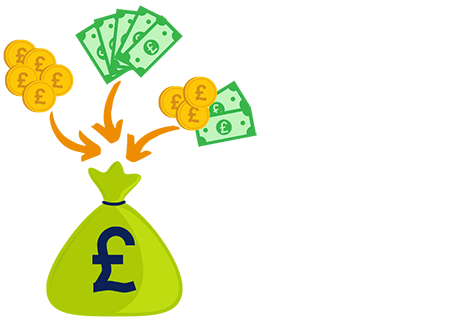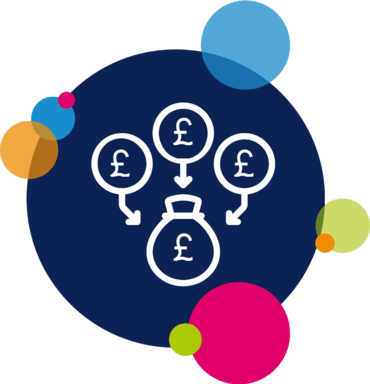
What is a debt consolidation loan?
Debt consolidation involves combining all your existing debts into one loan. This is achieved by getting a new loan, such as a secured loan, and using it to pay off your current debts.
The advantage? You only have to make a single monthly payment instead of juggling multiple outgoings. This can lower the chance of you missing payments and getting into further financial trouble.
Beyond simplifying your finances, if you qualify for a lower interest rate or spread the payments over a longer term, it can also reduce your monthly outgoings. However, this may also extend the terms of the debt and increase the total amount you repay. Therefore, it's advisable to thoroughly evaluate the pros and cons before making a decision.
Over the last 35 years, we've helped thousands of customers in this situation. Therefore, our experts may be able to help with your needs too.
What can debt consolidation loans be used for?
These loans are commonly used to pay off debts with high interest rates. However, you can also use them for different debts, even if the interest rates are lower.
Although this may be useful, it's important to be aware that combining debts with lower interest rates may result in paying more in interest compared to keeping each one separate.
You can consolidate various debts, like:
- Personal loans
- Mortgages
- Overdrafts
- Credit cards
- Overdue utility bills
One common situation is credit card debt consolidation. Due to the high interest rates on credit cards, many people choose to consolidate these balances to get a lower interest rate and reduce their monthly expenses.
However, keep in mind that if you decide to repay a debt earlier than agreed with the provider, there might be early repayment charges involved. These charges can be expensive, so it's crucial to carefully consider this before proceeding.

How do you apply for a debt consolidation loan?
We have made our process as easy for you as possible. Simply follow our three steps below:
- Add up all the debts you want to combine to see how much you need to borrow.
- Make an enquiry to our advisors by calling us. Or, complete our quick online form above and we will call you.
- Our experts will work to find a suitable product based on your brief. If successful and you're satisfied, we'll handle all communication with the lender and organise the final steps for you.
We understand you may be eager to get started on your plans, so we will keep in regular contact with you to give updates on the progress of your case. If any problems arise, we are here to support you.
To ensure the process runs quickly, make sure you have your bank statements, photo ID, and proof of address ready.
How do debt consolidation loans work?
Most loans work in a similar way where you take out a set amount of money and agree to pay it back over a specific period. The same applies to loans that are being used to pay off debts.
However, there are various types of loans you can get, leading to differences in eligibility criteria, borrowing amounts, and repayment terms.
- Secured loans
One solution that is popular for consolidating debts is secured loans. This solution takes a property you own as security, which means it can be repossessed if you fail to make repayments.
Using this option can be beneficial, as these lenders often have more relaxed criteria than high street mortgage providers or unsecured lenders. This means you may have a better chance of being accepted. However, it's important to ensure you can afford it, as failure to keep up with repayments could put your home at risk of repossession.
- Further advances
Another solution you can get is a further advance, which is where you borrow extra money from your first mortgage supplier. This can be useful as you already have a relationship with them.
However, some mortgage suppliers may be a bit hesitant about letting you borrow more for the purpose of consolidating debts. Repayment terms may also be shorter, which may make it harder for you to reduce outgoings.
- Unsecured loans
The final solution you may get is an unsecured loan, which are also often known as personal loans. This is where you take out money, but you don’t need to use a property as security against the loan. These solutions are beneficial if you do not have a property, or if you are not keen on the idea of using your house as security.
However, the interest rates can be higher and loan sizes may be restricted, as the risk of lending to you is higher when an asset is not used as security.
If you're facing debt challenges, speak with your lender quickly to explore possible support. You can do this directly or through a debt charity. By doing this, you may be able to reduce the amount you pay each month without having to take out a loan. If you need more information and free advice, contact: MoneyHelper or Citizens Advice Bureau (CAB).
Are debt consolidation loans a good idea?
Deciding whether this solution is a good idea for you depends on your own circumstances.
There can be great benefits from using loans to pay off debt. Some of these may include:
- You might gain better control of your finances – Managing a single monthly repayment is far simpler than juggling multiple payments. Therefore, you may find that you have much better control over your finances.
- There is potential for reduced monthly expenses– If you get a lower interest rate and pay your loan back over a longer term, your monthly repayments may be lower. So, your total monthly outgoings will be reduced.
- It may lower your chance of missing repayments – Only having to remember one monthly repayment is much easier than keeping track of multiple. Therefore, consolidating debts may help you to keep on top of your repayments, which can positively impact your credit score.
- Could help to speed up the process of paying off your debts - Consolidating debts can lead to lower interest payments, especially if you're consolidating credit with higher rates. This could mean that you have more money spare each month, which may allow you to make larger contributions to your repayments. This may speed up the process of paying your loan back.
Although these benefits are great, there can also be risks. It’s important to be aware of these, to understand whether it is the right option for you. Some of the risks may include:
- Could increase the total amount you repay – When you take out a loan you agree to a new repayment term, which could range anywhere from 3 to 30 years. If you spread the repayments over a longer period your monthly payments will be lower, but you will accrue interest for longer. This may increase the total amount you have to repay.
- May have extra costs – Getting a new loan can involve fees, so there may be extra costs involved. It’s important to factor these costs in when you’re deciding whether to get this solution.
- Property could be at risk of being repossessed – If the loan is secured against your property, any repayment problems could result in the lender repossessing the house.
How do I enquire?
We want to make the process of applying as smooth as possible. Here are the main steps involved in our application process.
-

Step 1: Submit an enquiry
Fill out our enquiry form online or call us to speak directly to one of our advisors.
-

Step 2: Speak to the team
After reviewing your enquiry, one of our experts will call you to discuss your situation.
-

Step 3: We'll handle the rest
If we find you a product that fits your needs and you're happy, we'll take care of the rest for you.
-

Step 4: Completion
Once all of the paperwork is completed, you will receive your funds.





